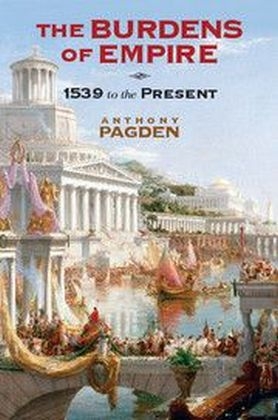
The Burdens of Empire
Cambridge University Press (Verlag)
978-0-521-18828-9 (ISBN)
Despite the long history of debate and the recent resurgence of interest in empires and imperialism, no one seems very clear as to what exactly an empire is. The Burdens of Empire strives to offer not only a definition but also a working description. This book examines how empires were conceived by those who ruled them and lived under them; it looks at the relations, real or imagined, between the imperial metropolis (when one existed) and its outlying provinces or colonies; and it asks how the laws that governed the various parts and various ethnic groups, of which all empires were made, were conceived and interpreted. Anthony Pagden argues that the evolution of the modern concept of the relationship between states, and in particular the modern conception of international law, cannot be understood apart from the long history of European empire building.
Anthony Pagden is Distinguished Professor in the Departments of Political Science and History at the University of California, Los Angeles. He has been a Fellow of Merton College, Oxford; Senior Research Fellow of the Warburg Institute, London; Professor of History at the European University Institute, Florence; University Reader in Intellectual History and Fellow of King's College, Cambridge; and the Harry C. Black Professor of History at The Johns Hopkins University. He is the author of more than a dozen books, many of which have been translated into a number of European and Asian languages. His most recent publications include Worlds and War: The 2,500-Year Struggle between East and West (2008) and The Enlightenment: And Why It Still Matters (2013). He has also written for the New Republic, the National Interest, the New York Times, the Los Angeles Times, El País (Spain), Il Sole 24 Ore (Italy), the London Review of Books and the Times Literary Supplement.
1. Introduction; 2. Defending empire: the 'school of Salamanca' and the 'affair of the Indies'; 3. 'Making barbarians into gentle peoples': Alberico Gentili on the legitimacy of empire; 4. The peopling of the New World: ethnos, race and empire in the early modern world; 5. Conquest, settlement, purchase and concession: justifying the English occupation of the Americas; 6. Occupying the ocean: Hugo Grotius and Serafim de Freitas on the rights of discovery and occupation; 7. Cambiar su ser: reform to revolution in the political imaginary of the Ibero-American world; 8. From the 'right of nations' to the 'cosmopolitan right': Immanuel Kant's law of continuity and the limits of empire; 9. 'Savage impulse-civilised calculation': conquest, commerce and the Enlightenment critique of empire; 10. Human rights, natural rights and Europe's imperial legacy.
| Verlagsort | Cambridge |
|---|---|
| Sprache | englisch |
| Maße | 150 x 230 mm |
| Gewicht | 430 g |
| Themenwelt | Geschichte ► Allgemeine Geschichte ► Neuzeit (bis 1918) |
| Geisteswissenschaften ► Geschichte ► Regional- / Ländergeschichte | |
| Geschichte ► Teilgebiete der Geschichte ► Wirtschaftsgeschichte | |
| Sozialwissenschaften | |
| ISBN-10 | 0-521-18828-8 / 0521188288 |
| ISBN-13 | 978-0-521-18828-9 / 9780521188289 |
| Zustand | Neuware |
| Haben Sie eine Frage zum Produkt? |
aus dem Bereich


